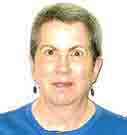|

|
The views expressed on this page are soley
those of the author and do not
necessarily represent the views of County
News Online
|
 |
The three hours
that changed history
By Susan Olling
We read lots of history in our house. Mr. History prefers the
Civil War and twentieth century conflicts. I have one foot is
planted firmly in the eighteenth century but have been known to read
history of more recent wars.
My annual Memorial Day read is The Longest Day by Cornelius Ryan.
This book is one of the best about the events of 06 Jun 1944, the first
cross-channel invasion of the France since 1415. Mr. Ryan
interviewed not only American soldiers and sailors but German, British,
and Free French troops. Civilians also provided material.
One of my favorite passages tells the story of a high school physics
teacher who created crossword puzzles for a London newspaper. He
was visited by MI-5. Some of the answers in his puzzles published
the month before D-Day were confidential code words about the
invasion: Utah, Omaha, and Overlord among them. The puzzles
in question could have been constructed months before, and the only
explanation Mr. Physics Teacher could suggest was coincidence.
Mr. Ryan also describes the reaction in the United States as word of
the D-Day became known. One of the best stories is about a nurse
at a Veterans Administration hospital who had to turn off the radio
when the successful invasion was announced. Even though she
wanted to listen, she was afraid the reports would excite her patient,
a World War One veteran with a cardiac condition. He wanted to be
on one of those beaches. The nurse’s son was a paratrooper who
landed in the early hours before the armada arrived off the French
coast.
Hell from the Heavens by John Wukovits tells the story of the largest
kamikaze attack on a single ship, the USS Laffey, during World War
Two. The destroyer and her crew had seen combat on D-Day and
three earlier engagements in the Pacific before the attack by
twenty-two kamikazes off Okinawa on 16 April 1945. The first
eight aircraft came in singly, and then the Japanese planes attacked in
pairs. Communication between the bridge and engine room was lost
during the attack. The engine room crew maneuvered the ship by
listening to the gunfire going on above them. The author includes
chapters relating the decision of the Japanese military to use
kamikazes and how this was alien to U.S. sailors. It was hard to
watch Japanese pilots deliberately crashing their aircraft into enemy
ships.
The USS Laffey is berthed at Patriot’s Point, South Carolina along with
the USS Yorktown.
Both books contain excellent photographs.
I can’t forget the eighteenth century, though.
The George Washington Book Prize is awarded each year at Mount
Vernon. Last year’s winning book was An Empire on the Edge
by Nick Bunker. The subject of this engaging volume: the
three years prior to 1775 and how a harmless article, tea, became
political dynamite. Mr. Bunker describes a world that isn’t too
different from what the United States has experienced in this
century. Dysfunctional government, debt (government and
personal), and economic bubbles were alive and well by the time there
was bloodshed in Massachusetts. The thirteen colonies were
founded, not by royal funding, but by private citizens. Each
colony governed itself and had a militia. Most politicians in
London didn’t think about these colonies at all, unless there was a
crisis. The British had created quite a commercial empire by the
early 1770s that looked like an enormous hedge fund. This empire
was an important source of revenue for the government, which was deeply
in debt after the Seven Year’s War. There were large risks being
taken in commodities such as tea and rice. The British East India
Company, the entity that controlled the tea trade in Britain, took the
greatest risks. By the early 1770s, it was awash in tea that it
couldn’t sell. The British government decided to flood the
markets here in the colonies with 600,000 pounds of tea, ostensibly to
stop the smuggling of tea into the colonies from other countries.
However, there was a small problem: the three pence per pound tax on
the tea. The Royal Governor of Massachusetts, Thomas Hutchinson,
and others seemed to have no idea how something as ordinary as tea
could create a firestorm, that the operation in Boston Harbor in
December 1773 was so smoothly carried out, and that the support for
protesting the tea tax went beyond Massachusetts. The Boston Tea
Party lasted three hours, but this political gesture and London’s
reaction to it were ultimately catastrophic for Great Britain.
Some think history is dry and boring. These books are anything
but dry and boring.
|
|
|
|

